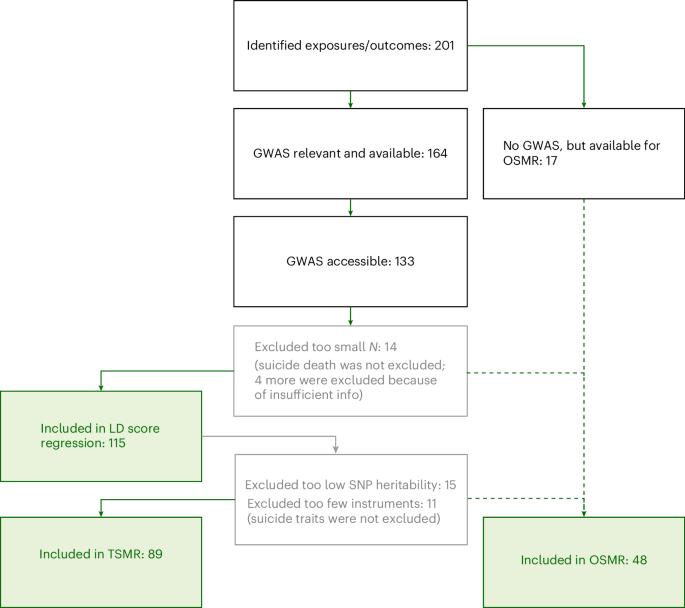An encompassing Mendelian randomization study of the causes and consequences of major depressive disorder
IF 8.7
引用次数: 0
Abstract
Major depressive disorder (MDD) is a prevalent and debilitating disorder whose causes and consequences remain insufficiently understood. Genetic variants can be used to study causal relationships with other traits. Here we reviewed 201 MDD-associated traits and performed genetic correlation analyses for 115 traits, two-sample Mendelian randomization for 89 of them, and one-sample Mendelian randomization for an additional 43 outcomes, applying sensitivity tests and power analyses. We show that MDD liability increases risk for poorer circadian, cognitive, diet, medical disease, endocrine, functional, inflammatory, metabolic, mortality, physical activity, reproduction, risk behavior, social, socioeconomic and suicide outcomes. Most associations were bidirectional, although with weaker evidence for diet, disease and endocrine traits causing MDD risk. These findings provide a systematic overview of traits putatively causally linked to MDD—confirming known links and identifying new ones—and underscore MDD as a cross-cutting risk factor across medical, functional and psychosocial domains. The authors analyze genetic correlations and perform Mendelian randomization to reveal bidirectional links between major depressive disorder and various traits, highlighting its role as an important risk factor across medical, functional and psychosocial domains and identifying potential causal relationships.

一项包含孟德尔随机研究的原因和严重抑郁症的后果。
重度抑郁症(MDD)是一种普遍存在的使人衰弱的疾病,其原因和后果仍未得到充分的了解。遗传变异可以用来研究与其他性状的因果关系。本研究回顾了201个mdd相关性状,并对115个性状进行了遗传相关分析,其中89个进行了双样本孟德尔随机化,另外43个进行了单样本孟德尔随机化,应用敏感性测试和功效分析。我们发现,重度抑郁症会增加较差的昼夜节律、认知、饮食、医学疾病、内分泌、功能、炎症、代谢、死亡率、身体活动、生殖、风险行为、社会、社会经济和自杀结果的风险。大多数关联是双向的,尽管饮食、疾病和内分泌特征导致重度抑郁症风险的证据较弱。这些发现提供了一个被认为与MDD有因果关系的特征的系统概述——确认了已知的联系并确定了新的联系——并强调了MDD是跨医学、功能和社会心理领域的交叉风险因素。
本文章由计算机程序翻译,如有差异,请以英文原文为准。
求助全文
约1分钟内获得全文
求助全文

 求助内容:
求助内容: 应助结果提醒方式:
应助结果提醒方式:


